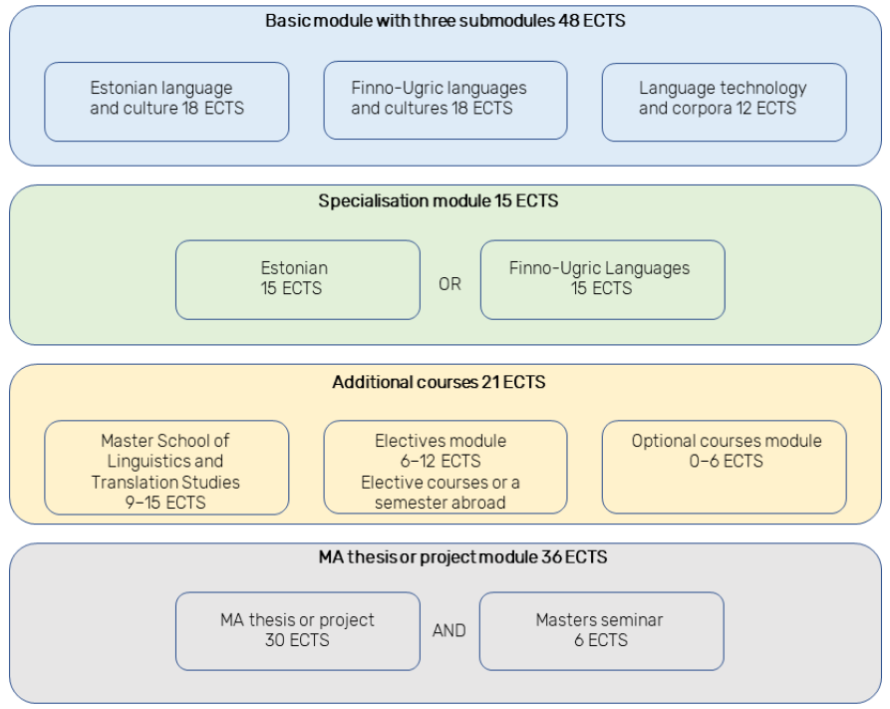Admission and studies
Institute of Estonian and General Linguistics provides higher education in Estonian, Finno-Ugric languages, general linguistics, and computational linguistics and conducts research in these fields. University of Tartu Linguistics is among the top 200 in the world (according to the QS World University Rankings by Subject). Here you can study Estonian more thoroughly than anywhere else in the world.
The Institute of Estonian and General Linguistics offers high-quality studies at all degree levels. We offer both Estonian-taught and English-taught programmes.
In English, we offer a master's degree programme:
- Estonian and Finno-Ugric Languages (details below)
In Estonian, we have bachelor's and master's degree programmes:
- Estonian and Finno-Ugric Linguistics (BA)
- Linguistics (MA)
- Teacher of Estonian Language and Literature (MA)
It is also possible to enter doctoral studies. Please note that some courses on that level are delivered only in Estonian, therefore, learning Estonian during studies is compulsory.
Admission for English-taught master's programmes for 2024/2025 academic year open on 2 January 2025 and the application deadline is 15 March 2025.

Estonian and Finno-Ugric Languages (MA)
The 2-year master's programme in Estonian and Finno-Ugric Languages (EFUL) is unique in combining in-depth language learning with comprehensive, English-based studies in linguistics. We offer specialisations in either Estonian or Finno-Ugric Languages. Whichever you choose, you will have access to shared modules on theoretical and methodological aspects of synchronic and diachronic linguistics, with an emphasis on active language learning, combining theory and practice.
The programme also emphasises the development of digital skills. You will get an overview of the Estonian and Finno-Ugric language corpora, databases and language technology resources necessary for carrying out fieldwork and linguistic research. In collaboration with the University of Tartu's Centre for Digital Humanities and Information Society, you can take computational linguistics and programming courses.
Programme structure

You can choose between two specialisations:
This specialisation includes in-depth studies in Estonian language and linguistics. Students begin studies at the appropriate language level according to their proficiency in Estonian. You will get additional support for learning Estonian from our Language Advisor for Non-Estonian Students. This module also gives an overview of the Estonian language as well as Estonian history and culture.
This specialisation gives an overview of the history and a comparison of Finno-Ugric languages and cultures. Students have the opportunity to study three or more Finno-Ugric languages. There are courses in Finnish, Hungarian, Komi, Livonian, Erzya, Saami varieties, Kamas, and others.
For further information, please contact the Programme Director Prof. Gerson Klumpp (gerson.klumpp@ut.ee).
What do students say?
"I first visited Tartu in 2018, when I attended IFUSCO (International Finno-Ugric Students’ Conference), organised by the Department of Estonian and General Linguistics. It was a life-changing experience, and after the conference, it was not even a question that I want to continue my studies at the University of Tartu. I like to live and study in Tartu because of the student-friendly environment, the cold Estonian winters, the excellent lectures and the various international opportunities that the University offers."


"My time at the University of Tartu has broadened my horizons through world-class courses in Tartu, on the one hand, and on the other hand a wide range of opportunities to spend some time abroad during my studies. This combination has prepared me professionally and personally for working abroad. After completing my MA in Tartu, I was employed as a teacher of Estonian language and culture at the university level in Germany and China.
In addition, Tartu as a university town offers the perfect balance of internationalization, at the same time as being peripheral enough to preserve a clean environment and closeness to nature. It’s the perfect alma mater, and that’s why I’ve decided to return here for my PhD studies."





